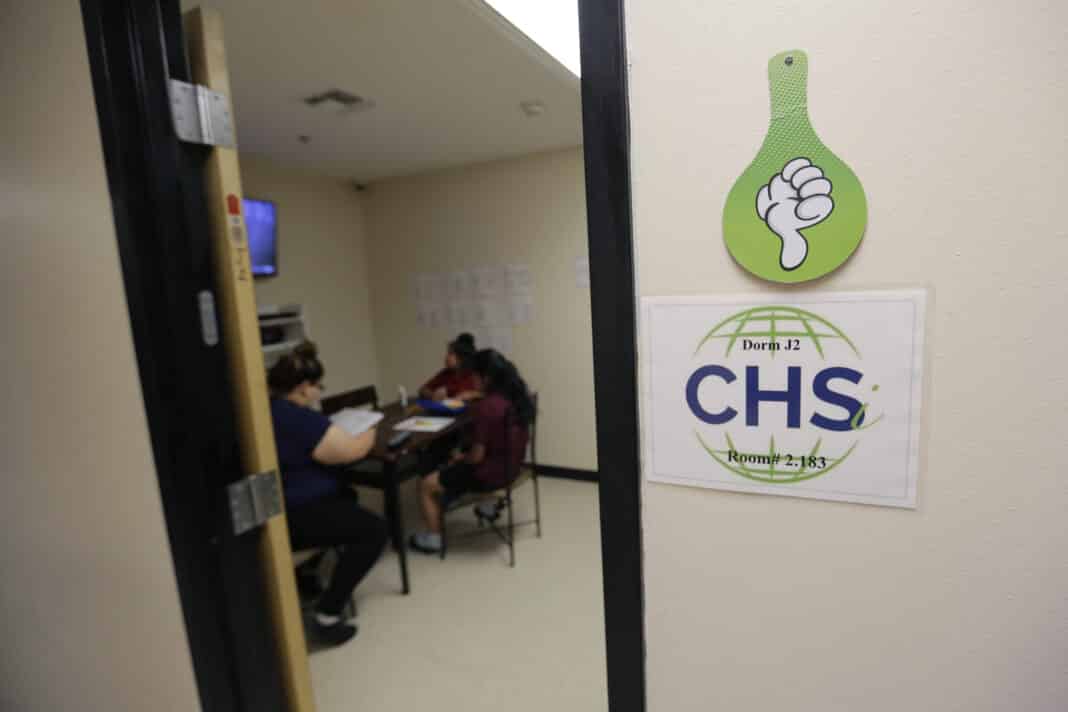A nonprofit is trying to warn the federal government about serious violations reported at shelters that previously cared for migrant children as the government prepares to dole out hundreds of millions of dollars in grants to entities willing to care for them.
Instances of sexual violence and negligent child care are just some of the violations reported at state-licensed child care facilities that an interfaith nonprofit published in a new report.
The report aims to re-address these issues at a time when the federal government has announced an $800 million grant opportunity in search of child care services for migrant children.
Unprecedented amounts of children crossing into the U.S. without a parent or legal guardian are overwhelming bed space at shelters contracted under the U.S. Health and Human Services’ Office of Refugee Resettlement. As a result, HHS is seeking to award grants totaling $800 million to providers who can provide shelter for children.
Texas Impact Foundation, an interfaith nonprofit organization that engages with lawmakers on public policy issues, researched violations at state-licensed child care facilities that could apply for those grants.
Researchers found 41 state-licensed facilities in Texas currently have contracts with ORR — a list was shared with Texas House committee meetings held July 12, 2019.
A search of a state-owned database found 983 licensing violations reported at those facilities from January 2015 to September 2020. About 38% of those violations, or 377, occurred in facilities located in the Rio Grande Valley.
The number of violations is believed to be higher, but three facilities, including Southwest Key-Combes in Harlingen, were either closed and/or their information was unavailable on the database.
Lutheran Social Services, a Corpus Christi child placing agency, had the highest number of violations with 82 reported — though the report found the violations happened in placements with foster care families.
The second-highest number of violations were reported at Southwest Key Casa Padre in Brownsville.
Within that five-year period, 66 violations were reported at the general residential operation facility there that provides 24-hour care.
REPORTS OF VIOLATIONS
About a third of all violations were considered to be high-risk.
A scale weighs the violations in four categories: high, medium-high, medium, medium-low and low. Though “personal judgement plays a role in the determination,” researchers found.
High-risk deficiencies include inappropriate or aggressive physical contact. One of those incidents happened at a facility at Southwest Key Casa Antigua in San Benito, where four teenage girls were allegedly “inappropriately touched by a male medical technician,” according to the report.
Children at the Shiloh Treatment Center near Houston were treated more aggressively, the Texas Impact report found.
It noted “staff intentionally and knowingly placed their arms around a child’s neck, obstructing their airway and causing the child to feel suffocated for a length of no less than two minutes.”
In another incident, a staff member placed their arms around a child’s neck, which prevented the child from vocalizing distress.
About 41% of deficiencies, the report found, were medium-risk. Though, the violations ranged from broken or missing drawer handles to inappropriate contact with a child in care.
About 40% of all violations, researchers found, “did not include correction narratives, any indication that compliance to correct the violation was met, or include the date compliance was verified.”
MISSING OVERSIGHT
The Texas Impact Foundation reached similar conclusions drawn by previous Office of Inspector General (OIG) and Government Accountability Office (GAO) reports.
In 2018, the OIG studied the grantee receiving the most children during fiscal year 2015, BCFS Health and Human Services. They reportedly failed to meet health and safety standards, including a lack of video monitoring in common areas, incompliance with state fire inspections, ill-equipped first aid kits and missing evidence of required background checks for employees.
In September 2020, the GAO published a report titled “Actions Needed to Improve Grant Application Reviews and Oversight of Care Facilities.” It became more relevant when the number of unaccompanied children crossing into the U.S started to rise.
The GAO reviewed 58 grant applications, but only 15 included information about whether there were state licensing allegations or concerns.
“The remaining 43 applications did not reference any licensing allegations or concerns,” the GAO report found. “Further, we found that several applicants had received state licensing citations in the past and one had previously had its state license revoked, but that information was not reported in their applications.”
ORR’s verification of applicants’ licensing information was also found deficient after the GAO found two applicants received grants even though they were ineligible, or were subsequently denied a state license “due to past licensing issues that ORR did not identify prior to awarding the grant, and which the applicants did not report in their applications,” the GAO report stated.
PROPOSED SOLUTIONS
Solutions proposed by the GAO report from September 2020 remain open, according to their website. That means, “actions to satisfy the intent of the recommendation have not been taken or are being planned, or actions that partially satisfy the intent of the recommendation have been taken,” the website states.
The Texas Impact Foundation is recommending the Biden administration direct ORR to make “simple, straightforward changes to their contracting processes, with meaningful deadlines for implementation and clear consequences for violators,” Sid Earnheart, the legal researcher, said via a news release.
The interfaith group is proposing improvements.
“The solutions are simple and inexpensive: requiring a facility’s violation history to be part of the application process; requesting that the state report any new or continuing violations directly to ORR; requiring a simple check by ORR employees of available information as part of the contracting process; and providing clear and effective sanctions for facilities that conceal information,” the Texas Impact Foundation news release stated.
On April 1, the HHS grant is scheduled to open to state-licensed facilities that can care for children, including independent school districts, city and county governments, nonprofits and for-profit businesses.





